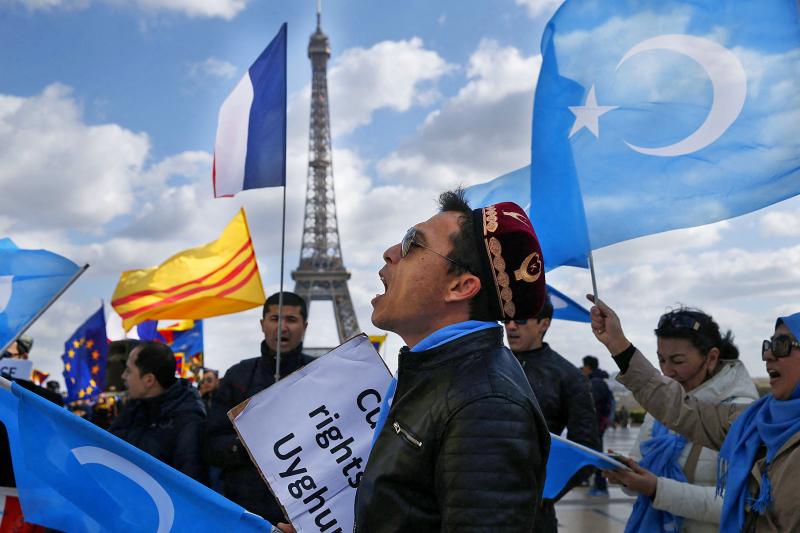Nearly one in 25 people in a county in the Uighur heartland of China have been sentenced to prison on terrorism-related charges, in what is the highest known imprisonment rate in the world, an Associated Press (AP) review of leaked data shows.
A list obtained and partially verified by the AP cites the names of more than 10,000 Uighurs sent to prison in just Konasheher county alone, one of dozens in southern Xinjiang.
The list is by far the biggest to emerge to date with the names of imprisoned Uighurs. It confirms what families and rights groups have said for years: China is relying on a system of long-term incarceration to keep the Uighurs in check.

Photo: AFP
Under searing international criticism, Chinese officials announced the closure in 2019 of short-term camps where Uighurs were held without charges, but thousands of Uighurs still languish for years or even decades in prison on what experts say are trumped-up charges of terrorism.
The list was obtained by Xinjiang scholar Gene Bunin from an anonymous source who described themselves as a member of China’s Han Chinese majority “opposed to the Chinese government’s policies in Xinjiang.” It was passed to the AP by Abduweli Ayup, an exiled Uighur linguist in Norway.
The AP authenticated the list through interviews with eight Uighurs who recognized 194 people listed, as well as legal notices, recordings of telephone calls with Chinese officials, and checks of address, birthdays and identity numbers.
Even a conservative estimate places Konasheher’s imprisonment rate at more than 10 times that of the US, one of the world’s leading jailers, according to US Department of Justice statistics.
It is also more than 30 times higher than for China as a whole, according to state statistics from 2013, the last time such figures were released.
“It is really remarkable,” said Darren Byler, an expert on Xinjiang’s mass incarceration system. “In no other location have we seen entire populations of people be described as terrorists or seen as terrorists.”

MORE VISITORS: The Tourism Administration said that it is seeing positive prospects in its efforts to expand the tourism market in North America and Europe Taiwan has been ranked as the cheapest place in the world to travel to this year, based on a list recommended by NerdWallet. The San Francisco-based personal finance company said that Taiwan topped the list of 16 nations it chose for budget travelers because US tourists do not need visas and travelers can easily have a good meal for less than US$10. A bus ride in Taipei costs just under US$0.50, while subway rides start at US$0.60, the firm said, adding that public transportation in Taiwan is easy to navigate. The firm also called Taiwan a “food lover’s paradise,” citing inexpensive breakfast stalls

PLUGGING HOLES: The amendments would bring the legislation in line with systems found in other countries such as Japan and the US, Legislator Chen Kuan-ting said Democratic Progressive Party (DPP) Legislator Chen Kuan-ting (陳冠廷) has proposed amending national security legislation amid a spate of espionage cases. Potential gaps in security vetting procedures for personnel with access to sensitive information prompted him to propose the amendments, which would introduce changes to Article 14 of the Classified National Security Information Protection Act (國家機密保護法), Chen said yesterday. The proposal, which aims to enhance interagency vetting procedures and reduce the risk of classified information leaks, would establish a comprehensive security clearance system in Taiwan, he said. The amendment would require character and loyalty checks for civil servants and intelligence personnel prior to

The China Coast Guard has seized control of a disputed reef near a major Philippine military outpost in the South China Sea, Beijing’s state media said, adding to longstanding territorial tensions with Manila. Beijing claims sovereignty over almost all of the South China Sea and has waved away competing assertions from other countries as well as an international ruling that its position has no legal basis. China and the Philippines have engaged in months of confrontations in the contested waters, and Manila is taking part in sweeping joint military drills with the US which Beijing has slammed as destabilizing. The Chinese coast guard

US PUBLICATION: The results indicated a change in attitude after a 2023 survey showed 55 percent supported full-scale war to achieve unification, the report said More than half of Chinese were against the use of force to unify with Taiwan under any circumstances, a survey conducted by the Atlanta, Georgia-based Carter Center and Emory University found. The survey results, which were released on Wednesday in a report titled “Sovereignty, Security, & US-China Relations: Chinese Public Opinion,” showed that 55.1 percent of respondents agreed or somewhat agreed that “the Taiwan problem should not be resolved using force under any circumstances,” while 24.5 percent “strongly” or “somewhat” disagreed with the statement. The results indicated a change in attitude after a survey published in “Assessing Public Support for (Non)Peaceful Unification